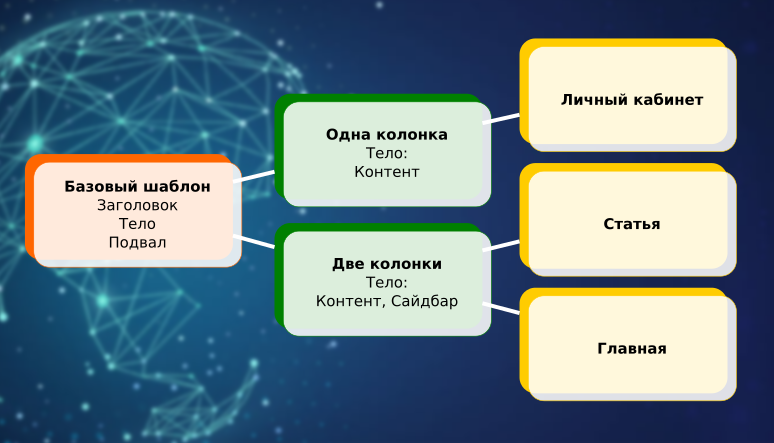
Somehow I came across a project on WordPress (WP), where I needed to make a custom theme. In WP, templates are native, which is good - you don't need to learn an additional language. But I really wanted to inherit templates like in Twig , and PHP can't do that out of the box.
It remains to solve the inheritance issue. After studying the problem, it was decided to be inspired by the phpti library , in which there were a couple of points that I really wanted to fix:
The author of the library wrote “Every Block is Always Executed!” In capital letters, that is, all blocks are executed, even if they are overridden, and will never be output.
- , , , - .
- .
ob_start
.
phpti startblock/endblock
import
:
<!-- -->
<?php startblock('blockName') ?>
<!-- -->
<?php endblock() ?>
<!-- -->
index.php
<?php include 'layout.php' ?> <!-- -->
<?php startblock('blockName') ?>
<!-- -->
<?php endblock() ?>
:
start/end . , .
. , , . . ?
, : , , .
, :
layout.php
//
<!-- -->
<?php slot('blockName', function(){ ?>
<!-- -->
<?php }) ?>
<!-- -->
index.php
<?php block('blockName', function(){ ?>
<!-- -->
<?php }) ?>
<?php include 'layout.php' ?> <!-- -->
slot
block
, , , .
. , .
root.php
- , :
<!DOCTYPE html>
<html>
<head>
<title>
<!-- '' - -->
<?php slot('title') ?>
</title>
</head>
<body>
<div id="root">
<!-- , -->
<?php slot('body', function () { ?>
<p>'body' :: root.php</p>
<?php }) ?>
</div>
</body>
</html>
two-columns.php
- :
<?php
block('title', function () { ?> <!-- '' - -->
Title :: two-columns.php
<?php });
block('body', function () { ?>
<div id="two-columnts">
<div id="main">
<?php slot('main', function () { ?> <!-- -->
<p>'main' :: two-columns.php</p>
<?php }) ?>
</div>
<div id="side">
<?php slot('side', function () { ?>
<p>'side' :: two-columns.php</p>
<?php }) ?>
</div>
</div>
<div id="footer">
<?php slot('footer', function () { ?>
<p>'footer' :: two-columns.php</p>
<?php }) ?>
</div>
<?php });
include './root.php'; // root.php
index.php
- , :
<?php
require_once '../src/InheritTpl.php';
block('title', function () { ?> 'title' :: index.php <?php });
block('side', function () { ?>
<p>'side' :: index.php</p>
<?php });
block('main', function () { ?>
<div id="main-index"> <!-- -->
<?php super() ?> <!-- -->
</div>
<?php });
// , ?
block('main', function () { ?>
<div id="main-index"> <!-- -->
<?php super() ?>
</div>
<?php });
// 'footer'
include './two-columns.php';
( ):
<!DOCTYPE html>
<html>
<head>
<title> 'title' :: index.php </title>
</head>
<body>
<div id="root">
<div id="two-columnts">
<div id="main">
<div id="main-index"> <!-- -->
<div id="main-index"> <!-- -->
<p>'main' :: two-columns.php</p>
</div>
</div>
</div>
<div id="side">
<p>'side' :: index.php</p>
</div>
</div>
<div id="footer">
<p>'footer' :: two-columns.php</p>
</div>
</div>
</body>
</html>
. , ?
Let's rewrite the example above for the phpti library. Let's give her a little head start, because there are no heavyweight overridden blocks in the example.
We will compare the time of 10,000 renders on PHP 8.0.2 and a 3.6GHz processor.
phpti: 0.831 seconds
subject: 0.353 seconds
As a conclusion, we can say that the size of the library has been reduced by 10 times, while the speed of the inheritance mechanism has increased at least 2 times.
You can view the source code here .